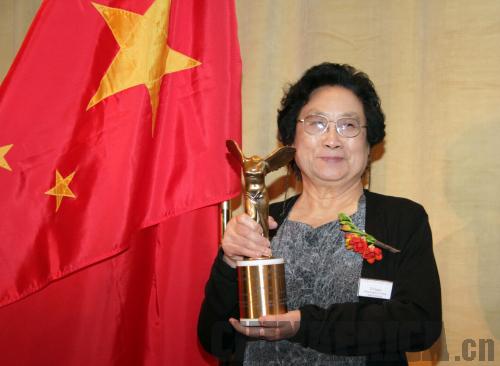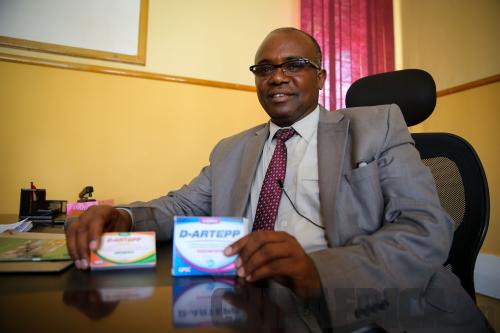| 
Tu Youyou receives her Lasker-DeBakey Clinical Medical Research Award trophy and certificate in New York City on September 23, 2011

Waqo Erjesa, head of the malaria control program of Kenya's Health Ministry, showcases China-made artemisinin-containing antimalarials during an interview with Xinhua News Agency in Nairobi on October 6
On October 5, Tu Youyou, a name unfamiliar even to most Chinese outside the scientific community, became the first from the Chinese mainland to win a Nobel Prize in the sciences.
The 85-year-old pharmacologist shared this year's Nobel Prize in Physiology or Medicine with Irish-born William C. Campbell and Japan's Satoshi Ōmura.
The Nobel Assembly honored Tu for finding a way to cure malaria based on the traditional Chinese medical treatment using extracts from the sweet wormwood plant. It led to the discovery of artemisinin, a drug that "has significantly reduced the mortality rates among patients suffering from malaria." Campbell and Ōmura were recognized for inventing a drug, Avermectin, to cure diseases caused by the roundworm.
Tu called artemisinin a gift bequeathed by traditional Chinese medicine (TCM) to humanity, after the prize was announced.
"The discovery of artemisinin is a successful example of collective research on TCM. The prize winning is an honor for China's science cause and TCM in their course of reaching out to the world," she said, according to a report from Xinhua News Agency.
The World Health Organization (WHO) recommends artemisinin-based combination therapies (ACTs) as the first-line treatment for uncomplicated malaria caused by plasmodium falciparum, a parasite carried by the anopheles mosquito. In Sub-Saharan Africa, approximately 240 million people have benefited from ACT treatment since 2000, according to WHO.
In a congratulatory letter, Chinese Premier Li Keqiang said Tu's laurel marks TCM's great contribution to the cause of promoting human health.
A hard-won success
Tu's research started in the 1960s, when China launched a program to find an herbal cure for malaria as the disease was becoming drug-resistant worldwide.
In 1969, Tu, then a researcher with the China Academy of Chinese Medical Sciences in Beijing, was appointed head of the government program. Prior to the appointment, she had been researching Chinese and Western medicines after graduating in 1955 from Beijing Medical College, now Peking University Health Science Center.
Tu was inspired by ancient Chinese medical treatises and folk remedies. She also visited and interviewed many experienced doctors.
Records in an ancient medical treatise made her realize that the extract from the sweet wormwood - artemisia annua, also known as qinghao in Mandarin - showed promising results when used in tests to treat malaria in mice.
She says the practice of using sweet wormwood to cure malaria was first recorded in the Manual of Clinical Practice and Emergency Remedies written by TCM master Ge Hong in the Eastern Jin Dynasty (317-420).
She reconfigured the process to extract the remedial ingredients from qinghao using ether. After 190 failures, Tu eventually achieved a dramatic breakthrough in 1971. During the process she volunteered to be the first human guinea pig to test the drug.
In 1972, a pure anti-malarial ingredient called qinghaosu was derived and became known as artemisinin.
Juleen R. Zierath, Chair of the Nobel Committee for Physiology or Medicine, said Tu's inspiration from TCM was important.
"But what was really critical was that Tu identified the active agent in that plant extract," Zierath told Xinhua News Agency. "There was a lot of modern chemistry and bio-chemistry attached to this to bring forward this new drug."
In 2011, Tu was awarded the Lasker-DeBakey Clinical Medical Research Award, commonly known as America's Nobel Prize, for the anti-malaria treatment.
While receiving the award, she said, "Continuous exploration and development of TCM will, without doubt, bring more medicines to the world."
Rising confidence
Addressing a forum sponsored by the State Administration of Traditional Chinese Medicine in Beijing on October 8, Tu said her discovery of artemisinin represents a combination of TCM knowledge and standard Western medicine procedures.
She called TCM a "great treasury" that needs further research so that it can generate more benefits in the future.
At the same event, Chen Zhu, Vice Chairman of the Standing Committee of the National People's Congress and former Minister of Health, also spoke highly of the multidisciplinary approach to medical research and drug development. Chen noted that great findings have been inspired by cornerstone TCM works and brought to fruition via the methods of modern Western medicine.
Chen said the method developed by him and fellow scientist Wang Zhenyi to use arsenic trioxide in a Western way to treat acute promyelocytic leukemia - white blood cell cancer - was also inspired by ancient TCM classics.
"Tradition is our source of inspiration, and modern technology takes it further. They don't go against each other. They go hand in hand with each other," Zhao Haiyu, an associate professor with the Chinese Academy of Chinese Medical Sciences, said during a TV interview.
Overseas promotion
TCM has begun to win increasing recognition in the world. According to Zhang Honglei, a researcher with the Nanjing University of Chinese Medicine in east China's Jiangsu Province, by 2010 there were 500,000 registered TCM practitioners in more than 160 countries and regions.
In Australia, Chinese medicine was brought under the National Registration and Accreditation Scheme and became a nationally regulated profession on July 1, 2012.
Lu Chuanjian, Vice President of Guangdong Provincial Hospital of Chinese Medicine, told China Daily recently that many Western pharmaceutical companies were looking for a natural product formula when developing new drugs.
Since 2008, Lu's hospital and Australia's Royal Melbourne Institute of Technology have launched a TCM project that combines modern interpretations of ancient treatises with high-level clinical research.
In April, the State Council, China's cabinet, announced a national program for developing TCM, pledging greater effort to promote TCM abroad over the next five years.
Prestigious TCM enterprises and medical institutions will be encouraged to set up hospitals or clinics abroad. The government will support large TCM service providers to operate internationally. It will also support cooperation programs on TCM education between Chinese and foreign universities and colleges.
However, TCM researchers and experts say the government still has much to do to help TCM go mainstream in the international market. It should cooperate with foreign governments for unified standards for the development and registration of patented TCM drugs.
Tu has a dream. In an article in science journal Nature in 2011, she wrote, "It is my dream that Chinese medicine will help us conquer life-threatening diseases worldwide, and that people across the globe will enjoy its benefits for health promotion."
|